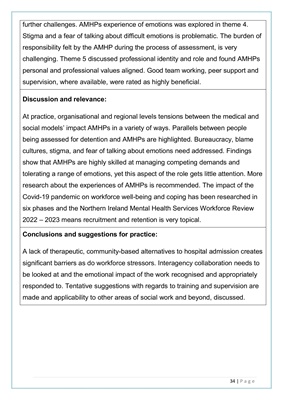
34 | P a g e
further challenges. AMHPs experience of emotions was explored in theme 4.
Stigma and a fear of talking about difficult emotions is problematic. The burden of
responsibility felt by the AMHP during the process of assessment, is very
challenging. Theme 5 discussed professional identity and role and found AMHPs
personal and professional values aligned. Good team working, peer support and
supervision, where available, were rated as highly beneficial.
Discussion and relevance:
At practice, organisational and regional levels tensions between the medical and
social models' impact AMHPs in a variety of ways. Parallels between people
being assessed for detention and AMHPs are highlighted. Bureaucracy, blame
cultures, stigma, and fear of talking about emotions need addressed. Findings
show that AMHPs are highly skilled at managing competing demands and
tolerating a range of emotions, yet this aspect of the role gets little attention. More
research about the experiences of AMHPs is recommended. The impact of the
Covid-19 pandemic on workforce well-being and coping has been researched in
six phases and the Northern Ireland Mental Health Services Workforce Review
2022 - 2023 means recruitment and retention is very topical.
Conclusions and suggestions for practice:
A lack of therapeutic, community-based alternatives to hospital admission creates
significant barriers as do workforce stressors. Interagency collaboration needs to
be looked at and the emotional impact of the work recognised and appropriately
responded to. Tentative suggestions with regards to training and supervision are
made and applicability to other areas of social work and beyond, discussed.